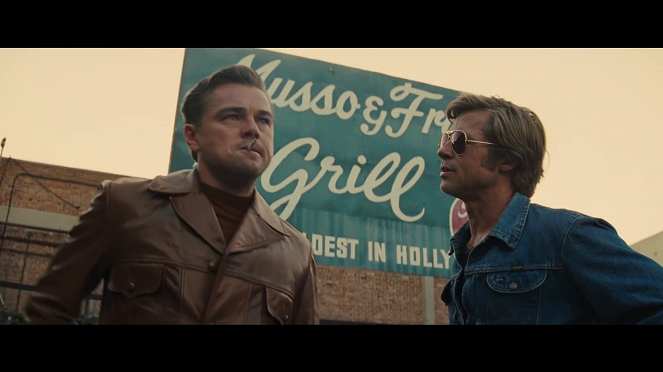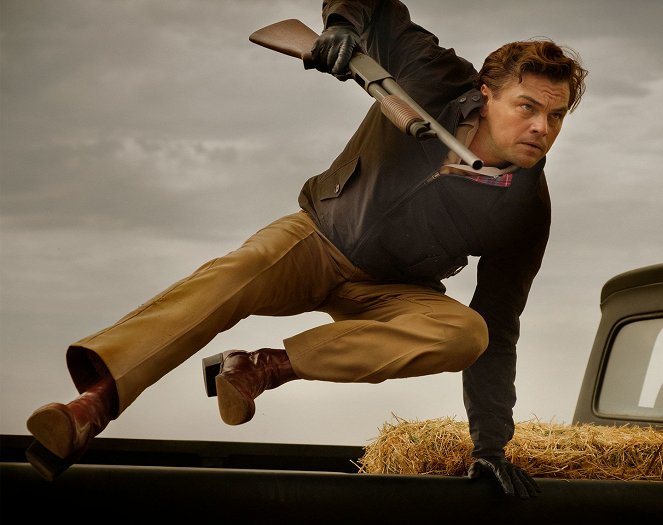Directed by:
Quentin TarantinoScreenplay:
Quentin TarantinoCinematography:
Robert RichardsonCast:
Leonardo DiCaprio, Brad Pitt, Margot Robbie, Emile Hirsch, Margaret Qualley, Timothy Olyphant, Julia Butters, Austin Butler, Dakota Fanning, Bruce Dern (more)VOD (4)
Plots(1)
Set in Hollywood in 1969, film star Rick Dalton (Leonardo DiCaprio) relies on his stunt double Cliff Booth (Brad Pitt) to make him look good. With his career rapidly failing, Dalton accepts a part in a Spaghetti Western that he believes is beneath him. When actress Sharon Tate (Margot Robbie) moves in to the house next door, Dalton sees her as a way back in to Hollywood. But after Charles Manson (Damon Herriman) pays them a visit, their plans for the future get put on hold. (Sony Pictures Home Entertainment)
(more)Videos (6)
Reviews (21)
As Tarantino stated in an interview with Time magazine, “I thought, we don’t need a story. They're the story.” It does not matter at all that Once Upon a Time in Hollywood is less spectacular that Tarantino’s previous films (with the exception of Jackie Brown, with which it shares a slow pace, melancholic mood and greater focus on the characters). More than on perfectly timed jokes, memorable one-liners, unexpected twists and building tension in long sequences, the film relies on the characters’ emotions (or what – like Sharon Tate – they symbolise), construction of a fictional world, the period atmosphere and the actors’ charisma. At the same time, it has an inventive three-act structure that serves well both as an evocation of the late 1960s in Los Angeles and another of Tarantino’s discussions over film/real violence and cinema as a means of living multiple lives in parallel and bringing that which has perished back to life. SPOILERS FOLLOW! From great details to greatness as a whole. From a poster-boy hero to a hero who saves actual lives. From Nazisploitation to exploitation inspired by the Manson Family. A recollection of an era when American films became more artsy (The Graduate, Easy Rider) under the influence of European cinema and more violent under the influence of the Vietnam War and turmoil on the streets (Bonnie and Clyde, The Wild Bunch). Tarantino’s use of those techniques (for example, jump cuts and long, hopeless drives as in films of the French New Wave) recalls the given period not only through music, set design and costumes, but also in formal terms. Conversely, classic Hollywood is represented by two burnt-out cowboys who, like the long-serving bosses of the major studios, do not understand young “fucking hippies” and, in the narrative that is newly taking shape, are condemned to play the roles of villains, with which they have no intention of reconciling themselves. However, the end of their era is inevitable. The protagonist of the cowboy movie that Rick reads is taken out of action roughly halfway through the story due to a hip injury. Cliff is likewise injured at the end of the film. Thus, at the end of Once Upon a Time in Hollywood, it seems that we are only halfway through Cliff and Rick’s story. Their fate is already sealed and though the conclusion of the film, while rectifying one tragedy, may seem to be a happy ending, we know that the heroes do not come out of it well (the fact that Trudi Fraser/Jodie Foster reads a biography of the, for her, brilliant Walt Disney, whose racism and anti-Semitism will begin to be addressed many years later, has a similar maliciousness). In my opinion, the key to the cohesiveness of the narrative and understanding of the story lies in the blending together or, more appositely, doubling of the individual planes of this fictional world and their relationship to actual historical events that play a significant role in shaping our expectations and emotional response. We see Sharon Tate as she was depicted in period promotional videos and photographs (the fact that someone is looking at her, amplifying her unreachability, is accentuated throughout the film, though particularly during the Playboy party, when McQueen comments on her from afar). In the only scene where Sharon herself is watching, we actually watch Margot Robbie, admiring her murdered acting colleague on the screen. Cliff, peculiarly behind the movie screen (of a drive-in cinema), represents a truer version of Rick, as he endures actual blows for Rick and does the work that makes it possible for him to exist in the world of film and television (if he hadn’t repaired the television antenna, they would not be able to watch Rick’s cameo at the FBI). The heroes exist through stories in which they also play stories told about them, which – this is essential for Tarantino’s narrative concept – we do not always know whether they are true (did Cliff kill his wife or not?). Lines delivered in the context of a role have an impact on what happens in the characters’ lives (Rick as DeCoteau tells Luke Perry’s character that he will send his man to his ranch – we subsequently see Cliff coming to Spahn Ranch). The climax of breaking down the boundaries between the real and the possible is Cliff’s encounter with a trio of murderers, whose genuineness he doubts under the influence of LSD. His dog, which is basically the only one that does not play any role, but just simply is (a dog), has no doubts and will do the lion’s share of the work in eliminating the intruders. The relationship between film and reality, the actor and his role, and violence and its representation in the media has always fascinated Tarantino, at least as much as women’s feet. This time, he plays with the transitions between one and the other perhaps even more ingeniously than ever before, and even after two viewings, I still do not feel (not by a long shot) that I would be able to grasp and uncover everything that the film has to offer. 90%
()
(less)
(more)
Hmm! Watching Once Upon a Time in Hollywood is a bit like when the proud parent of a newborn shows you an album full of pictures of their baby, gushing over it and expecting you’d gush too. But even though the photos are really nice, after a couple of pages it stops being fun, and you end up not giving a toss about the brat. Similarly, in his new film Tarantino gushes over the Hollywood of the 1960s, playing entire, often incredibly long scenes of old, mostly fictitious films that have nothing to do with anything that could be called a “plot”. And yeah, it’s nice, cute, atmospheric.. but, for someone who doesn’t care much about old Hollywood, it lasts too long. And this is not what I would love to see from Quentin. This is only masturbating over the atmosphere of the movies from the 60s, a time that is long gone. And on top of that, it’s almost without humour, which was the biggest surprise to me. The occasional efforts also fall pretty flat. For example, the scene with Bruce Lee was so incredibly stupid that I was embarrassed by it. There was a man sitting behind me in the cinema who laughed loudly for about two minutes and I just shook my head because there was really nothing to laugh about! I don’t know, this time Tarantino simply didn’t make a film for me. Only the scene at Spahn’s Ranch and the famous climax show what this film could’ve been if it’d really been “about the Manson Family”, as the reports of the new Tarantino movie said.
()
Tarantino's worst film and one of the most tiring cinema experiences ever. There are only two things to praise about this film, namely the decent retro styling and the perfect performances of Brad Pitt and Leonardo DiCaprio, the rest is not even worth mentioning. Bruce Lee is in the film for two minutes and it's no wonder the daughter is upset for the travesty they put him on. Charles Manson is in the film for five seconds! (and it’s what the film was originally supposed to be about) And the alluring Margot Robbie is in the film for about eight minutes total. So more or less, it’s two and a half hours of bullshit about something that I don't give a shit about. But I don't care at all, and I could still get over the fact that Tarantino ditched the action, but to ditch the humour as well? Well, that deserves punishment. It's saved a little by the ending, which Pitt steals for himself, and at least in the last ten minutes Tarantino makes it clear that he's the director, but that’s not enough with a three-hour running time. My friends gave up on the film halfway through. This one passes me by. 40%
()
The ever-increasing navel-gazing seemed to me to be a recipe for disaster. After the admirable Inglourious Basterds, Quentin Tarantino started flagging with Django Unchained, only to slightly overdo it with The Hateful Eight, saved only by the actors and a decent amount of tension. The prospect of another film lapping at the three-hour mark, this time around in tribute to golden era and voluntarily apologizing in advance for its disregard of the audience, therefore tempted me very cautiously. However, the biggest surprise lies in just how wrong I was. Instead of traditionally engaging in endless conversations, the author fragilely confesses his love in a hundred and one ways. Unlike many of his previous works, he does not brag about his own talent; he genuinely and solely pays tribute to the talent of others and wants nothing more than to return to the sixties, immerse himself in them, and simply experience that boundless enchantment with film and television that only early youth can bring. So even though the drawn-out running time seems like showing off in principle, partly because it only slightly and superficially expands on the genre (just try retelling the Sharon Tate storyline yourself), a smile came to my lips incredibly often. The almost playful idea of digging your claws into a beloved world or period, where you tell the story "your own way", could theoretically become a goal for countless other directors, but something tells me that many of them would blindly break their own teeth on it.
()
Once Upon a Time in Hollywood may not be quite the movie for me. On the one hand, I appreciate that Quentin Tarantino can make a film that looks good, has great music, is nice to watch, and everyone who appears in front of the camera pushes themselves to the limit. In this case, however, we may not have completely met at the story. Once Upon a Time in Hollywood follows a bit in the footsteps of Inglorious Basterds, unfortunately, however, this time Tarantino is not making a variation or homage to a specific genre, but rather to a time and industry. And truthfully, I know more or less nothing about the television industry in 1960s America, and of the shows discussed here, I've heard of about one in three. Of course, I don't want to say that this is Tarantino's fault – he said himself that this film was going to be very personal to him and it shows. But in short, he's dealing with things I'm not familiar with, and frankly don't even care much about. I felt similarly "off" with his Jackie Brown years ago, because the blaxploitation subgenre didn't do anything for me either. As a result, with Once Upon a Time in Hollywood, I often sat in front of the screen and thought that what was going on was probably cool, it was based on something and referencing something, but since I don't know what it's referencing at all, I can't quite get into it. That's more my fault than the film itself, but the fact remains that I'll probably never watch it a second time.
()


